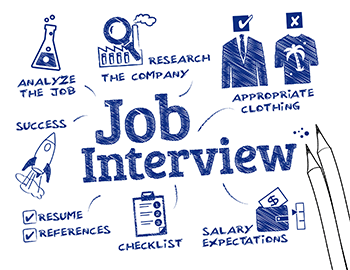
Be Prepared
Job interview preparation goes beyond showing up. Preparation includes knowing something about the company, those who are interviewing you and the copmpany culture. It also includes having a list of well thought out questions about the job for which you are applying. Companies and employers are not in business for the purpose of giving you money or training. They are in business to make money and being prepared is about showing them what you bring to the company to help them succeed.
Check out the company
Learn everything you can about the company, and if you will be working in a particular location or branch, about that one. Find out where they are, what is special/unique about them, what their focus is, and as much s you can about the company culture (is it young and hip, or conservative and old-school)?
Know with whom you are meeting
Find out with whom you will be meeting and find out everything you can about them on LinkedIn and Facebook. What is their title and how long have they been with the company? What other positions have they held? To whom do they report? Find out about them personally too. You may have some things in common. Where did they go to school? What other interests do they have?
Its good to know what they look like so when you meet them, you will recognize who is whom.
Have answers to these questions
There are many questions an employer will ask you and many will be dependent on the job for which you are applying. For good job interview preparation, try to imagine any question they may ask and be sure you have a good answer- especially for the questions that will be difficult, such as explaining what you were doing for the three yours you were in the pen.
The following questions you need to have good answers for and be ready to get the answers into the conversation even if they aren’t asked:
- What do you bring to the table
- Why you want to work for THIS company
- Why should they hire you over other candidates for the job
They may also ask what are your 1 year, 5 year, and long-term career goals. It’s good to know the answer to these questions to be sure in your own mind that this job opportunity takes you toward the goals, not away from them.
Create a list of questions about the job
Be sure you have a clear job description. Problems with job expectations (yours or the boss’s) always start with a poorly drawn job description.
Job interview preparation works two ways and employers need to prepare too. Ask any questions/concerns you may have about the job description, to whom you will report, what are normal expectations about hours and production, when you would begin. Also, find out if there is a training period and who will be your mentor /trainer as you learn the job.
Ask them how they would define a successful employee in this role.
All these questions show them that you take the position and your place in the company seriously.
Dress Appropriately
A job interview is not the same as working there. Always dress for a job interview better than you would for the job. Better that they tell you you can dress down for the job, than not consider you because you are under dressed. This means dress as a professional, not like its casual anyday.
Job Interview Preparation includes Being on time
Do a dry run of getting to the job if at all possible. With Google maps, be sure you know what the building looks like. If the time gives a range of 25-40 minutes, allow 40. Better you have to stall at a coffee shop or store or sit in your car for 15 minutes than they have to wait for you for even one.
Allow at least ½ hour extra time to get ready and ½ hour extra to get there for all the things that can go wrong.
Pay Attention to your Gut
I understand how important getting a job is, but as I told my son, they will never treat you better than the first time they meet you. If they treat you poorly before, during or after the interview, think long and hard about the job. I have ignored this a couple of times to get a job and regretted it. I have never heard of anyone not regretting going against a gut instinct that its a bad fit.
Having said that . . .
Be Respectful and Considerate of the Employer
Email or mail a thank you note thanking the people you interviewed with for their time. It shows you were serious about wanting the job and you have good manners.
If you are made an offer, don’t stall getting back with an answer. If you agree to take the job, there is no excuse for not showing up. If you must change your mind, let them know as soon as possible and with as much time before the start date as you can to allow them to try to find someone else.
Once you take the job, know the rules about notice to leave and follow them. More about on-the-job in the next post.
Happy job hunting!

Leave a Reply